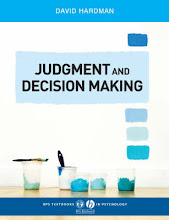In 2008, Volume 1 of Psychological Review contained a critique of the theory of probabilistic mental models (PMM) and fast and frugal heuristics, authored by Dougherty, Franco-Watkins and Thomas (DFT). The same issue contained a rejoinder by Gigerenzer, Hoffrage, and Goldstein (GHG), with both sets of authors also contributing postscripts. As with any such interchange, more points were made than can easily be summarized, so the original articles should be referred to for the finer details.
Dougherty et al argue as follows:
The Take The Best heuristic assumes that cues are accessed according to their validities. This means that the cue validities must be precomputed and stored in memory. In their 1991 paper on PMM, Gigerenzer et al had suggested that frequency information might be tracked and stored in memory, as proposed by Hasher & Zacks. However, several studies have produced data inconsistent with this idea. Even if people do count frequencies, computing cue validities would be a massively complex task.
In particular, the computation of cue validities would require recording the co-occurrence of a target variable and the absence of information (in addition to other co-occurences). However, evidence indicates that people are more sensitive to positive occurrences than to negative ones.
Cue generation may be driven by memory retrieval processes (e.g. recency) rather than precomputed cue validities.
The recognition heuristic is not consistent with models of memory. In particular, it wrongly assumes that recognition is all-or-none, rather than a matter of degree. Data presented by Goldstein and Gigerenzer (2002) can be explained in terms of familiarity rather than recognition.
Subsequent interchange
GHG responded by reiterating that they had not made a strong commitment to the counting of frequencies in their 1991 paper, and that the ordering of validities in the TTB heuristic is subjective, not ecological. DFT considered that this made the TTB heuristic vague (alluding to Gigerenzer's 1996 critique of Kahneman and Tversky). GHG et al responded that the notion of subjective validities was based on the assumption that people sample from memory in order to construct validities. Thus, subjective validities are not entirely idiosyncractic.
Regarding the recognition heuristic, GHG stated that this operates on a Yes/No recognition judgment, rather than on an item being remembered or not remembered. However, because the recognition heuristic - according to this specification - is not grounded in a theory of memory, DFT considered that this account renders the recognition heuristic vague as well. GHG, however, noted that a memory-based account of judgment that had been referred to had been carried out in their lab.
References
Dougherty, M.R., Franco-Watkins, A.M., and Thomas, R. (2008). Psychological plausibility of the theory of Probabilistic Mental Models and the Fast and Frugal Heuristics. Psychological Review, 115 (1), 199-213.
Dougherty, M.R., Thomas, R., and Franco-Watkins, A.M. (2008). Postscript: Vague heuristics revisited. Psychological Review, 115 (1), 211-213.
Gigerenzer, G., Hoffrage, U., and Goldstein, D. (2008). Fast and frugal heuristics are plausible models of cognition: Reply to Dougherty, Franco-Watkins, and Thomas (2008). Psychological Review, 115 (1), 230-239.
Gigerenzer, G., Hoffrage, U., and Goldstein, D. (2008). Postscript: Fast and frugal heuristics. Psychological Review, 115 (1), 238-239.
Subscribe to:
Posts (Atom)
About Google Analytics
This website uses Google Analytics, a web analytics service provided by Google, Inc. (“Google”). Google Analytics uses “cookies”, which are text files placed on your computer, to help the website analyze how users use the site. The information generated by the cookie about your use of the website (including your IP address) will be transmitted to and stored by Google on servers in the United States . Google will use this information for the purpose of evaluating your use of the website, compiling reports on website activity for website operators and providing other services relating to website activity and internet usage. Google may also transfer this information to third parties where required to do so by law, or where such third parties process the information on Google's behalf. Google will not associate your IP address with any other data held by Google. You may refuse the use of cookies by selecting the appropriate settings on your browser, however please note that if you do this you may not be able to use the full functionality of this website. By using this website, you consent to the processing of data about you by Google in the manner and for the purposes set out above.



